Best Feed for Ram Losing Weight
Just like humans, some dogs have a tendency to gain weight and end up bulging at their seams.
This can cause a number of different health problems, which will reduce their quality of life and potentially shorten it too.
But it isn't terribly difficult to help your dog shed a few pounds – in fact, it's pretty simple. You just need to help her burn a few more calories than she takes in. To do so, you'll likely need to switch her to a food designed for weight loss, but you'll also want to get her moving around a bit more.
Below, we'll explain some of the problems with canine obesity, discuss the things that place a dog at risk of weight gain, recommend a few good weight-loss foods and provide some additional suggestions for maximizing your dog's weight loss.
Want to jump straight to the good stuff? Here are our top quick picks – or keep reading for more details!
- Wellness Complete Healthy Weight [Best Overall] — Wellness Healthy Weight features chicken and chicken meal as the first ingredients, along with wholesome hearty grains like brown rice as well as nutritious fruits, vegetables, and four probiotic strains.
- Nutro Natural Healthy Weight [Fewest Calories Per Cup] — With only 228 Calories per cup, the Nutro recipe is a great option for owners interested in helping their pooch lose weight quickly.
- Wellness CORE's Reduced Fat [Best Grain-Free Option] — Most owners who tried this recipe loved it, and it helped several dogs lose a bit of weight, making it an ideal choice for dogs who need a grain-free diet.
The Problem with Canine Obesity
Like most other animals, dogs function best at a relatively narrow weight range. This range obviously differs from one breed to the next, but when any dog gains too much weight, her health will begin to suffer.
- Joint Problems. Dogs who are forced to haul around extra weight place additional wear and tear on their joints. This can lead to arthritis, exacerbate problems like hip dysplasia and increased susceptibility to sprains and strains.
- Diabetes Mellitus. Overweight dogs have more body tissue than they should, which means that their pancreas cannot produce enough insulin to metabolize the sugars in their bloodstream. If left unchecked, this can cause nerve problems, impair kidney function and shorten your dog's lifespan.
- Heart Disease. Increased body weight places increased demands on your dog's heart muscle, which results in inefficient circulation. Additionally, this stress can lead to congestive heart failure, a condition in which your dog's heart slowly fills with fluid.
- Hypertension (high blood pressure) is a serious medical condition that can stress your dog's internal organs (especially the kidneys) and increase her risk for cardiac problems and stroke.
- Breathing Difficulties. Too much body weight can make it difficult for a dog's diaphragm to move effectively, which will cause your dog to exhibit labored breathing. This will also reduce the amount of oxygen reaching your dog's body tissues, which will often cause fatigue and lethargy.
- Liver Problems. Your dog's body stores some fat in the liver for emergency purposes, but overweight dogs often store too much fat in their liver. This decreases the ability of the liver to function properly, which can cause a variety of subsequent health problems.
- Predisposition to Overheating. The more body fat your dog has, the more body heat she'll retain. This means that overweight dogs may suffer from higher body temperatures than those of healthy body weight, which can make them feel miserable and avoid activity whenever possible.
- Skin Problems Skin and coat problems are more common among dogs that are overweight than those who are within their recommended weight range. Additionally, obesity can create skin folds, which can trap oils and dirt and lead to further problems.
- Reproductive Failure. Like most other animals, overweight dogs are at increased risks of reproductive failure. Overweight dogs may experience disruptions to their hormonal cycles, and they are more likely to suffer miscarriages or difficult labor than healthy dogs are.
- Increased Cancer Risk. Although scientists do not yet fully understand the causal link between obesity and cancer, research indicates that overweight dogs are at increased risk of developing mammary tumors and bladder cancer.
- Decreased Lifespan. Because of the above-listed problems and others, dogs who are overweight rarely live as long as their healthy counterparts. In some cases, obesity may reduce a dog's lifespan by several years.
What Causes Dogs to Gain Weight?
Dogs gain weight for one, and only one, reason: They metabolize more calories than they burn off through exercise. The same principle holds true for all biological systems.
Ingested energy (calories) must be used in some way, and if your dog's breakfast isn't used for chasing the mailman, it'll be used to create additional body tissue – primarily fat.
Now, there are several things that can alter the number of calories your dog requires or change the way in which your dog's body uses the calories she eats.
For example, just because your dog eats 100 Calories of chicken doesn't mean her body will extract all 100 Calories — portions of the food may pass through her system intact and the bacteria in her digestive tract will consume some of the calories.
Additionally, some dogs can utilize more of the calories in a given food than others, some dogs burn more calories while exercising than others, and some foods may even alter a dog's metabolic rate. So, it isn't always possible to figure out the exact number of calories your dog is consuming or burning.
But, the ultimate cause for weight gain is an imbalance in the calorie-in / calorie-out arithmetic.
Dogs Predisposed to Weight Gain
Canine obesity is, as they say, a first-world problem. Wild and feral canines rarely have the chance to consume enough food to pack on the pounds; it is only those dogs who live in the lap of luxury who are realistically at risk of obesity.
Older Dogs
A dog's metabolism normally slows with age, and most dogs will begin to pack on the pounds more easily as they reach their golden years.
Additionally, older dogs are rarely as active as younger dogs are, which further contributes to weight gain.
Inactive Dogs
Dogs who don't run, jump, and play very much won't burn enough calories to remain at a healthy body weight.
Dogs Recovering from Injury or Illness
Dogs who are recovering from injuries or illness are rarely able to exercise very much, which can lead to a caloric imbalance.
Dogs with Other Health Conditions
Some medical conditions can affect a dog's metabolic rate or cause their body to handle their calories improperly. For example, hypothyroidism – a condition in which a dog's thyroid gland fails to produce the proper amount of hormones – is often associated with weight gain.
Dogs Fed too Many Calories
Dogs who are allowed to eat whenever they want (also known as free feeding) or who are routinely provided with more calories than they need will usually gain weight.
Dogs Taking Some Medications
Some medications can reduce the metabolic rate of dogs or ramp up their appetite – either of which can cause them to store the excess calories they ingest as fat. Corticosteroids, for example, often cause dogs to begin eating more and running around less, and they often cause weight gain.
Altered Dogs
While most people can and should have their dog spayed or neutered, and these procedures typically provide a number of health benefits, altered dogs typically have slower metabolic rates than unaltered dogs do.
What Makes a Food Good for Weight Loss?
There are a variety of dog foods available that are marketed for weight loss, but that doesn't mean they are all good choices. Some of the things you'll want to look for when selecting a food for losing weight include:
Reduced Caloric Content
Most good weight-loss foods have fewer calories than normal foods do.
Just as there is a subset of high-calorie dog foods to help a dog gain weight, there are diets with less calories to help a dog shed off pounds too.
Ideally, such foods will still provide the same amount of bulk, so that your dog feels full after eating. This is normally accomplished by increasing a food's fiber content. Fiber contains very few useable calories, yet it takes up plenty of space in your dog's gut.
Additionally, many foods that are designed for weight loss feature increased protein levels and decreased fat levels. This helps to reduce the caloric content of the food (fats contain more calories per weight than proteins or carbs), while the increased protein helps ensure your dog gets the nutrition she needs.
As a rule of thumb, you'll want to look for foods with less than 400 Calories per cup, but those containing less than 300 Calories per cup are even better.
Delicious
A good weight-loss food must still appeal to your pup's palate, or she may stop eating altogether. Accordingly, you'll still want to look for foods made with delicious proteins and fats, so your dog doesn't go on a hunger strike.
Nutritious
It is very important that your dog's food provides the necessary vitamins, minerals, and the appropriate amounts of the major macromolecules (proteins, fats, carbohydrates and nucleic acids) that she needs to remain healthy. The primary difference between weight-loss foods and normal foods should be caloric content.
Fortified with Probiotics
Probiotics are beneficial bacteria that help your dog's intestinal tract operate effectively. By selecting foods with probiotics, your dog will be less likely to suffer from intestinal upset as she changes foods, and her body will be better able to digest her food properly.
General Dog-Food Buying Guidelines
Whether you are looking for a weight-loss formula or a regular dog food, you'll always want to make sure you select a food that meets a few key criteria. Among other things, you'll want to look for a food that:
- Was made in a country with high safety standards . This essentially means selecting foods made in the USA, Canada, Western Europe, Australia or New Zealand.
- Features a whole protein at the beginning of the ingredient list . Dogs are omnivores, but meat should unquestionably form the bulk of their diet, so select foods with things like deboned chicken or beef at the beginning of the ingredient list.
- Does not contain artificial colors, flavors or other additives . Artificial colors and flavors are unnecessary additives for well-conceived foods, and they may trigger canine food allergies. Accordingly, they are best avoided.
- Does not contain unidentified meat meals or byproducts . While properly labeled and identified meat products, such as "chicken meal" and "beef meal" are fine ingredients, you'll want to avoid things like "meat meal," which may contain ingredients collected from unsavory sources.
9 Best Dog Foods for Weight Loss
The following nine foods are delicious, nutritious and tasty, and they should all help your dog to lose a little weight. Just try to select the one that best addresses your pup's specific needs and discuss your choice with your vet.
1. Wellness Complete Healthy Weight
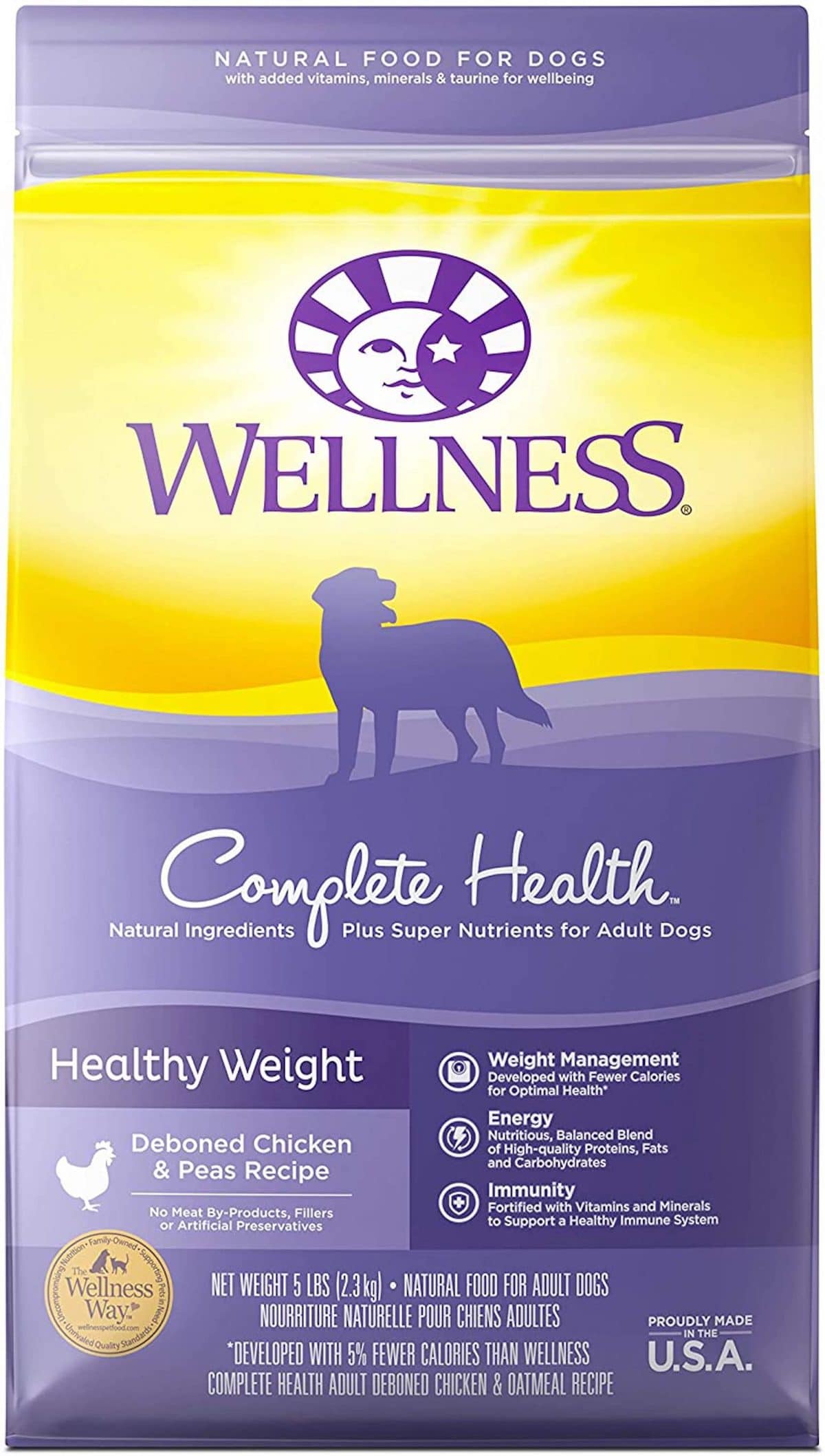
Wellness Complete Healthy Weight
Chicken-based weight-control formula
Features chicken and chicken meal as first ingredients for lean protein source, along with healthy grains like oatmeal and brown rice for a low cal diet.
About: The entire Wellness Complete Health product line has a number of very impressive foods, and their Healthy Weight recipe is no exception.
Like all other Wellness Complete products, this formula contains no artificial additives, poultry by-products or fillers, but as a weight-control formula, it contains less fat than some of their other recipes.
Features: Wellness Complete Healthy Weight Recipe is packed with premium proteins, including deboned chicken, chicken meal, and whitefish. It is also made with a number of whole grains, which will keep your pup feeling full for longer and provide long-term energy.
The fruits and vegetables included in the recipe are perhaps the most impressive thing about this food. Among others, spinach, carrots, sweet potatoes, and blueberries appear in Wellness Complete's Healthy Weight Recipe.
These will not only provide vitamins and minerals, and improve the taste of the food, they'll provide your dog with immune-system boosting antioxidants too.
Four different probiotics are included in this chicken-based dog food recipe to help promote proper intestinal function, and it is fortified with vitamins and minerals to ensure your dog gets the nutrition she needs.
PROS
The majority of owners who tried Wellness Complete Healthy Weight were very pleased with the recipe. Several specifically mentioned that it helped their dog lose weight or stop gaining weight. Owners also loved the ingredient list and the food's very reasonable cost, while dogs appear to love the taste.
CONS
We'd prefer if Wellness Complete Healthy Weight Recipe contained fewer calories, but it certainly isn't a high-calorie food. A few owners also complained that this food made their dog gassy, but this is a relatively minor (and occasionally hilarious) problem. Some owners may be troubled by the inclusion of garlic powder and tomato pomace in this recipe, but these ingredients (in the quantities they appear) should not cause your dog any problems.
Calories per Cup: 405
Ingredients List
Deboned Chicken, Chicken Meal, Oatmeal, Ground Brown Rice, Ground Barley... ,
Peas, Tomato Pomace, Rice, Ground Flaxseed, Tomatoes, Chicken Fat, Carrots, Natural Chicken Flavor, Potassium Chloride, Choline Chloride, Spinach, Vitamin E Supplement, Taurine, Zinc Proteinate, Mixed Tocopherols Added to Preserve Freshness, Sweet Potatoes, Apples, Blueberries, Zinc Sulfate, Calcium Carbonate, Niacin, Ferrous Sulfate, Iron Proteinate, Vitamin A Supplement, Glucosamine Hydrochloride, Chondroitin Sulfate, Ascorbic Acid (Vitamin C), Copper Sulfate, Thiamine Mononitrate, Copper Proteinate, Chicory Root Extract, Manganese Proteinate, Manganese Sulfate, D-Calcium Pantothenate, Sodium Selenite, Pyridoxine Hydrochloride, Riboflavin, Yucca Schidigera Extract, Garlic Powder, Vitamin D3 Supplement, Biotin, Calcium Iodate, Vitamin B12 Supplement, Folic Acid, Dried Lactobacillus Plantarum Fermentation Product, Dried Enterococcus Faecium Fermentation Product, Dried Lactobacillus Casei Fermentation Product, Dried Lactobacillus Acidophilus Fermentation Product Rosemary Extract, Green Tea Extract, Spearmint Extract.
2. Wellness CORE Reduced Fat Grain-Free

Wellness CORE Reduced Fat
Premium grain-free weight management formula
This reduced fat formula (25% less than than normal formula) doesn't skimp on protein, with lean turkey, turkey meal, and chicken meal as the first 3 ingredients.
About: Wellness CORE's Reduced Fat Recipe is a grain-free weight-management food, which contains a wealth of high-value ingredients while still providing a reduced number of calories.
Made with almost every dietary bell and whistle an owner could want, Wellness CORE is designed to satisfy all of your dog's nutritional needs.
Features: Wellness CORE Reduced Fat Grain-Free Recipe is US-made food that contains several great protein sources, including turkey, turkey meal, chicken meal and chicken liver.
As its name implies, it is made without grains and instead relies on potatoes and sweet potatoes to provide the bulk of its carbohydrate content.
A wealth of antioxidant-rich fruits and vegetables – including parsley, blueberries, kale, carrots, and broccoli, among others – are included in the recipe to boost the nutritional value and provide interesting tastes and textures for your pooch.
The antioxidants provided by these ingredients ensure that your dog's immune system will be operating at peak efficiency.
Salmon oil is used to provide Omega-3 fatty acids, which will keep your dog's coat and skin looking great, while four different probiotic strains are mixed in to help keep your dog's tummy working properly.
PROS
Wellness CORE Reduced Fat Recipe is one of the best-rated foods on the market. Its ingredient list is very impressive, and few other foods provide the sheer number of healthy items that CORE does. Despite having reduced fat content, most dogs appear to find this recipe very palatable and digest it very easily.
CONS
Few owners had anything negative to say about Wellness CORE Reduced Fat Grain-Free. However, it would be nice if this recipe had fewer calories.
Calories per Cup: 360
Ingredients List
Deboned Turkey, Turkey Meal, Chicken Meal, Potatoes, Peas... ,
Dried Ground Potatoes, Pea Fiber, Tomato Pomace, Chicken Liver, Chicken Fat (Preserved with Mixed Tocopherols), Natural Chicken Flavor, Ground Flaxseed, Salmon Oil, Spinach, Vitamin E Supplement, Broccoli, Carrots, Choline Chloride, Parsley, Apples, Blueberries, Kale, Sweet Potatoes, Taurine, Mixed Tocopherols Added to Preserve Freshness, Zinc Proteinate, Zinc Sulfate, Glucosamine Hydrochloride, Chondroitin Sulfate, Calcium Carbonate, Niacin, Ferrous Sulfate, Iron Proteinate, Beta-Carotene, Vitamin A Supplement, Copper Sulfate, Thiamine Mononitrate, Copper Proteinate, Manganese Proteinate, Manganese Sulfate, D-Calcium Pantothenate, Sodium Selenite, Pyridoxine Hydrochloride, Riboflavin, Chicory Root Extract, Yucca Schidigera Extract, Vitamin D3 Supplement, Biotin, Calcium Iodate, Vitamin B12 Supplement, Folic Acid, Ascorbic Acid (Vitamin C), Dried Lactobacillus Plantarum Fermentation Product, Dried Enterococcus Faecium Fermentation Product, Dried Lactobacillus Casei Fermentation Product, Dried Lactobacillus Acidophilus Fermentation Product, Rosemary Extract, Green Tea Extract, Spearmint Extract.
3. Fromm Gold Weight Management Recipe

Fromm Gold Weight Management
Ultra-premium diet dog food
Made with real turkey liver, chicken meal, and other quality animal proteins, this recipe also features hearty grains as well as no artificial colors, flavors, or dyes.
About: Fromm Gold Weight Management Recipe is a super-premium dog food, designed to taste great, while still helping your pooch to lose a little weight.
Free of artificial colors, flavors, and dyes, Fromm Weight Management is full of nutritious ingredients – including a few unusual items — that are sure to please owners and pups.
Features: Fromm Gold Weight Management Recipe is a slightly unusual food, which distinguishes it from most other weight-loss foods. For example, turkey liver is the very first item on the ingredient list. Several other common proteins are included as well, including duck, chicken meal, menhaden fish meal and lamb.
Fromm is also made with a number of great fats, which help to ensure it tastes great. These include salmon oil and chicken fat, as well as cheese – a rather unusual (but delicious) ingredient among dog foods. Along with the salmon oil, flaxseed is included to provide omega-3 fatty acids.
Pearled barley and oatmeal provide the bulk of the carbohydrate content, although brown rice, white rice, and millet also appear on the ingredient list.
Carrots, lettuce, and celery also appear amongst the ingredients, and they are included to provide vitamins, minerals and a bit of fiber.
PROS
Most owners were very happy with this recipe and — unsurprisingly, given the ingredients contained in the food – most dogs love the taste. As a weight-management recipe, this particular product hasn't received many reviews, but more than one owner reported that it helped their dog shed a bit of weight.
CONS
Few owners had anything negative to say about Fromm Gold Weight Management Recipe. It is quite expensive, and we'd prefer if the probiotics included in the recipe were individually listed, but there are few other downsides to this food.
Calories per Cup: 341
Ingredients List
Turkey Liver, Chicken Meal, Pearled Barley, Oatmeal, Dried Tomato Pomace... ,
Turkey Liver, Chicken Meal, Pearled Barley, Oatmeal, Dried Tomato Pomace, Duck, Menhaden Fish Meal, Brown Rice, White Rice, Millet, Chicken, Flaxseed, Pea Fiber, Potatoes, Dried Whole Egg, Salmon Oil, Chicken Fat, Lamb, Cheese, Brewers Dried Yeast, Alfalfa Meal, Carrots, Lettuce, Celery, Chicken Cartilage, Potassium Chloride, Salt, Taurine, Chicory Root Extract, Calcium Sulfate, Yucca schidigera Extract, L-Carnitine, DL-Methionine, L-Tryptophan, Sodium Selenite, Sorbic Acid (Preservative), Vitamins, Minerals, Probiotics.
4. Dr. Tim's Premium Weight Management Pet Food

Dr. Tim's Weight Management Food
Premium weight management formula
This recipe relies on the chicken meal as the primary protein source, contains several fiber sources and is formulated to speed up your dog's metabolism.
About: Dr. Tim's Weight Management Food is specifically designed to help speed your dog's metabolism, thereby increasing her caloric needs. Despite featuring relatively few calories, this recipe is formulated to keep your dog full between meals, through the inclusion of several different fiber sources.
Features: Dr. Tim's Premium Weight Management Food relies on the chicken meal as the primary protein, and it also includes a salmon meal and chicken liver meal as well.
Brown rice and whole oats provide the bulk of the carbohydrate content, and several vegetables, including dried field peas, parsley, spinach, and celery, are included in the recipe.
Dr. Tim's Recipe also features a few rather odd ingredients, including watercress and – oddly enough – pig's blood (technically, just the plasma). Ground flaxseed meal is mixed in for the omega-3 fatty acids, while several fibrous plant materials are added to increase the food's fiber content. This includes things like beet pulp, psyllium seed husk, and chicory root.
Chicory root is particularly noteworthy, as it is a prebiotic – a food for beneficial bacteria. This helps ensure that the probiotics included in the recipe will be able to colonize your dog's digestive tract.
PROS
Dr. Tim's Weight Management Food is a bit of a niche product, so there haven't been very many reviews of it. However, the majority of the owners who did share their experiences were quite pleased, and several reported that their dog lost weight after switching to the food.
CONS
Dr. Tim's Recipedoesn't contain any whole proteins, which is somewhat disappointing. But, this probably shouldn't be a deal-breaker for most owners.
Calories per Cup: 269.6
Ingredients List
Chicken Meal, Brown Rice, Whole Oat Groats, Dried Field Peas, Powdered Cellulose... ,
Dried Plain Beet Pulp (Sugar Removed), Salmon Meal, Chicken Fat (Preserved With Mixed Natural Tocopherols, A Source Of Vitamin E), Dried Egg Product, Dried Porcine Plasma, Chicken Liver Meal, Whole Ground Flaxseed Meal, Calcium Carbonate, Dried Carrots, Dried Celery, Dried Beets, Dried Parsley, Dried Lettuce, Dried Watercress, Dried Spinach, Salt, Menhaden Fish Oil (Preserved With Mixed Natural Tocopherols, A Source Of Vitamin E), Lecithin (Sunflower Derived), Dried Chicory Root (Source Of Inulin), DL-Methionine, Choline Chloride, L-Lysine, Dried Kelp, Potassium Chloride, Dried Bacillus Coagulans Fermentation Product, Yucca Schidigera Extract, Psyllium Seed Husk, L-Ascorbyl-2-Polyphosphate (Source Of Vitamin C), Calcium Carbonate, Zinc Proteinate, Manganese Proteinate, Copper Proteinate, Zinc Sulfate, Vitamin E Supplement, Ferrous Sulfate, Niacin Supplement, Copper Sulfate, Thiamine Mononitrate, D-Calcium Pantothenate, Vitamin A Supplement, Manganous Oxide, Pyridoxine Hydrochloride, Sodium Selenite, Riboflavin Supplement, Vitamin D3 Supplement, Biotin, Vitamin B12 Supplement, Calcium Iodate, L-Carnitine, Folic Acid.
5. Eagle Pack Reduced Fat Dog Food
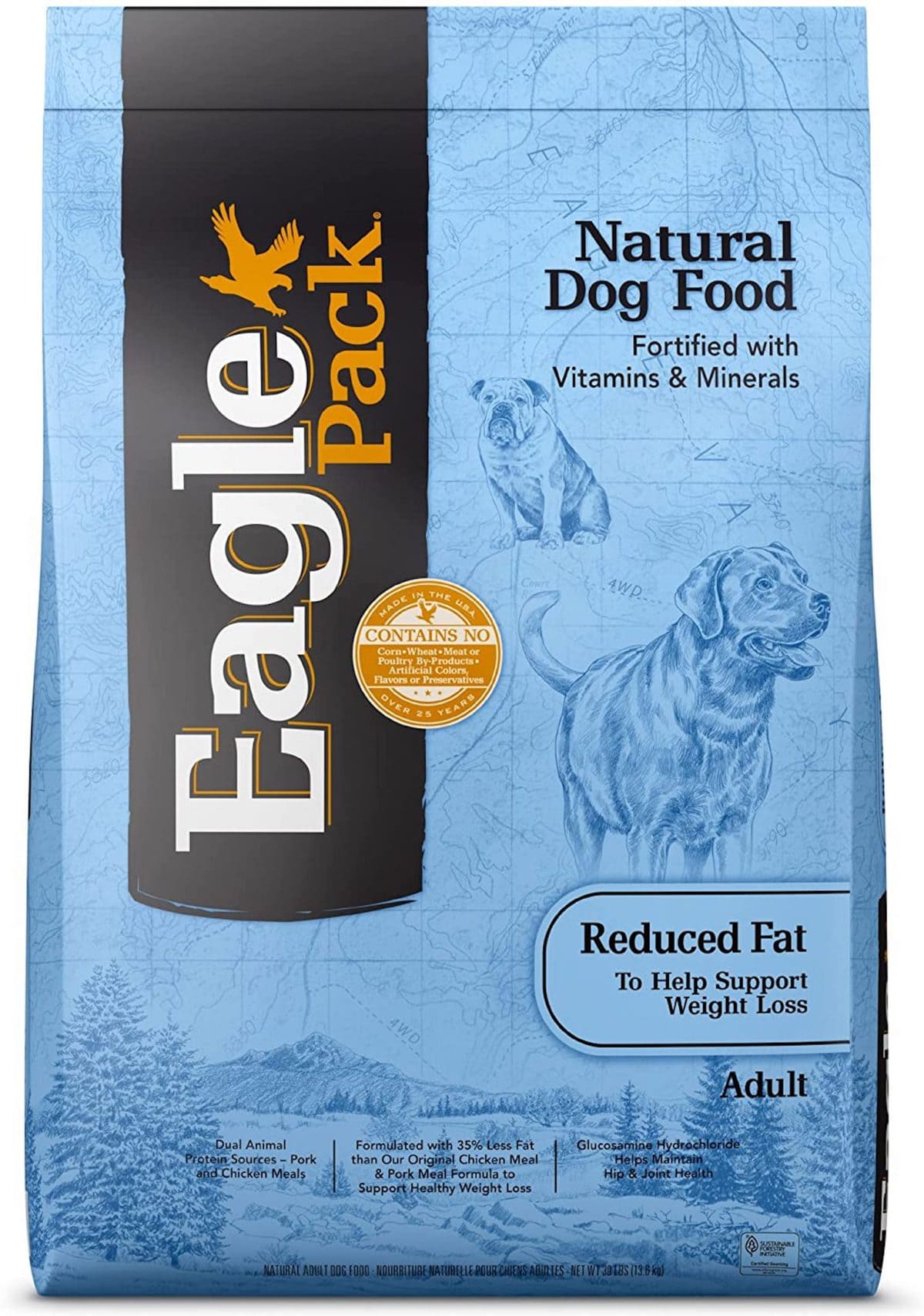
Eagle Pack Reduced Fat Dog Food
Grain-inclusive, pork-based healthy weight recipe
A reduced-fat recipe with pork meal as the primary source of protein, plus eight probiotic strains which are not found in most other dog foods.
About: Eagle Pack's Reduced Fat Recipe is a weight-loss formula, which reduces its caloric content by limiting the amount of fat in the food.
But despite having less fat than typical dog foods, Eagle Pack Reduced Fat Recipe still provides all of the nutrition your dog needs to remain healthy while losing weight.
Features: Pork meal is the primary protein in Eagle Pack Reduced Fat Recipe, but the chicken meal and turkey meal are also included too.
Dehulled barley, ground brown rice and oatmeal supply the bulk of the food's carbohydrates.
In some ways, Eagle Pack Reduced Fat Recipe is a no-frills dog food, as it lacks the fruits and vegetables that are included in many other foods. However, by contrast, it contains more supplemental ingredients than most of its competitors.
For example, in addition to the standard vitamin and mineral supplements used in many foods, this recipe includes eight(!) probiotic strains – several of which are not found in many other foods. This reduced-fat recipe also includes glucosamine, which is an important cartilage-supporting compound that can help dogs with hip dysplasia and other joint ailments.
Note that this food has a large kibble size, which may present problems for small and toy breeds.
PROS
Most owners who tried Eagle Pack Reduced-Fat Recipe were extremely happy with the product. Most dogs found it tasty, and several owners reported that it helped their dog to lose weight. A few even mentioned improved energy levels after switching to Eagle Pack.
CONS
The lack of a whole protein and the limited number of fruits and vegetables in the recipe are troubling. Some owners don't like to see tomato pomace in foods, but it is unlikely to cause your dog harm.
Calories per Cup: 343
Ingredients List
Pork Meal, Dehulled Barley, Peas, Ground Brown Rice, Oatmeal... ,
Pork Meal, Dehulled Barley, Peas, Ground Brown Rice, Oatmeal, Rice, Tomato Pomace, Chicken Meal, Turkey Meal, Flaxseed, Chicken Fat (preserved with Mixed Tocopherols), Brewers Dried Yeast, Potassium Chloride, Inulin, Vitamins [Vitamin E Supplement, Niacin, Vitamin A Supplement, Ascorbic Acid (Vitamin C), Thiamine Mononitrate, d-Calcium Pantothenate, Pyridoxine Hydrochloride, Riboflavin, Vitamin D3 Supplement, Biotin, Vitamin B12 Supplement, Folic Acid], Minerals [Zinc Proteinate, Zinc Sulfate, Iron Proteinate, Ferrous Sulfate, Copper Sulfate, Copper Proteinate, Manganese Proteinate, Manganese Sulfate, Sodium Selenite, Calcium Iodate], Taurine, Calcium Carbonate, Mixed Tocopherols added to preserve freshness, Glucosamine Hydrochloride, Dried Enterococcus faecium Fermentation Product, Dried Bacillus licheniformis Fermentation Product, Dried Bacillus subtilis Fermentation Product, Dried Aspergillus oryzae Fermentation Product, Dried Trichoderma reesei Fermentation Product, Dried Rhizopus oryzae Fermentation Product, Dried Lactobacillus acidophilus Fermentation Product, Dried Lactobacillus casei Fermentation Product, Rosemary Extract, Green Tea Extract, Spearmint Extract.
6. Nutro Ultra Weight-Management Dog Food
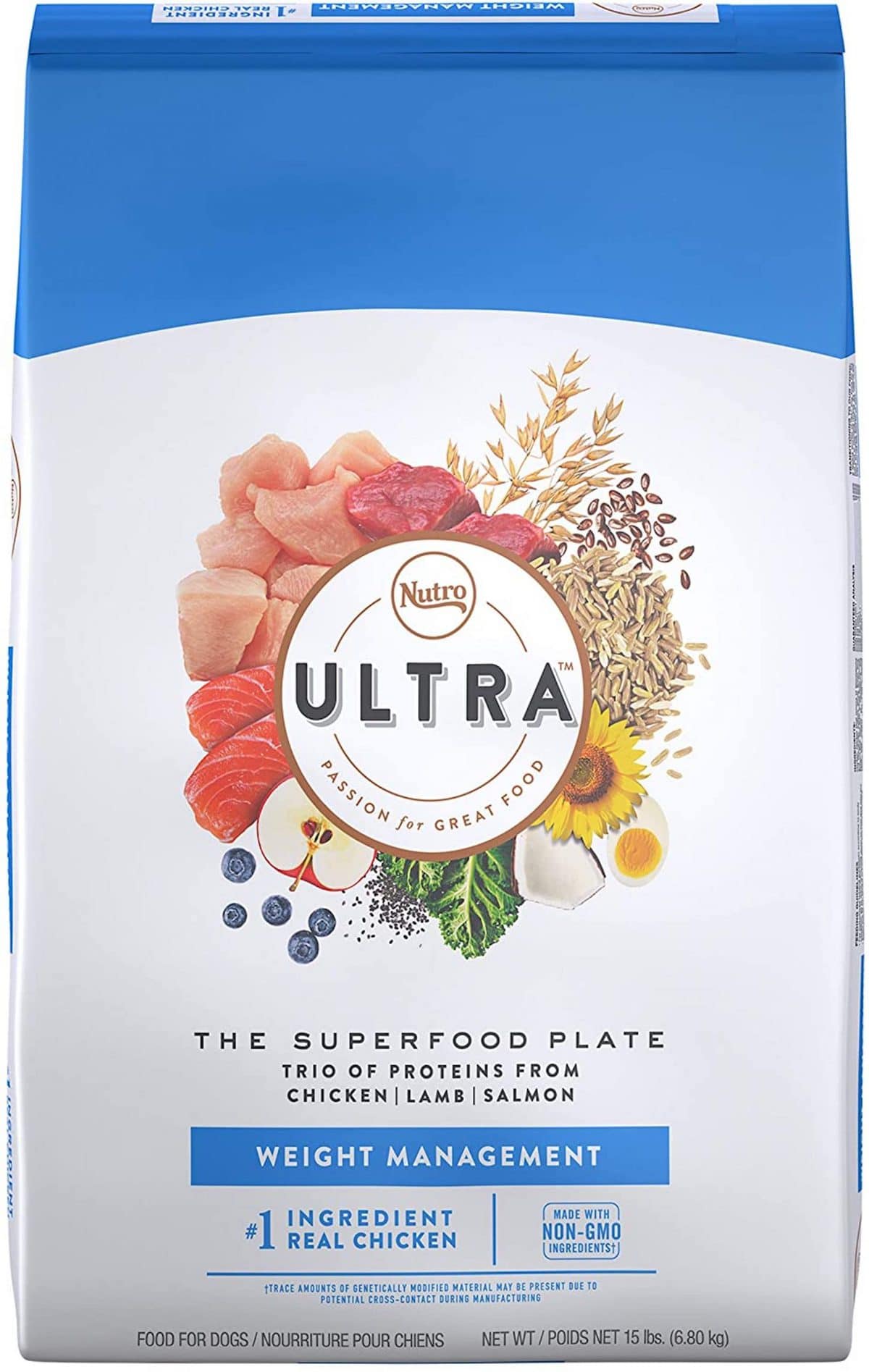
Nutro Ultra Weight-Management Dog Food
Grain-inclusive weight-loss formula
Features whole grains and three lean animal proteins from farm-raised chicken, pasture-fed lamb, and salmon. Also includes glucosamine and added taurine.
About: Made with a blend of three different proteins (salmon, lamb, and chicken), Nutro Ultra Weight Management Recipe is a nutritious weight-loss formula that should help most dogs drop a few pounds.
And although this is a relatively low-calorie food, it contains a number of tasty ingredients to ensure it still pleases your pup's palate.
Features: Like most other high-quality foods, Nutro Ultra Weight-Management Recipe features a whole protein — real chicken, in this case — at the top of the ingredient list. But as mentioned earlier, it contains additional proteins, including chicken meal, salmon meal, and lamb meal.
But Nutro's Ultra Weight-Management Recipe isn't just a collection of good proteins — it also contains a variety of nutritious carbs, fruits, and vegetables.
Rice and oatmeal provides the bulk of the carbohydrates, while dried spinach, dried blueberries, and dried apples (among others) provide vitamins, minerals, antioxidants, and a bit of extra flavor too. A variety of vitamin and mineral supplements round out the ingredient list.
PROS
We love the inclusion of several different protein sources in this recipe, and most owners who've tried the food seem to agree with us. It's also full of "superfoods," which may help keep your pup's immune system operating at peak efficiency. Most dogs seem to enjoy the way the recipe tastes.
CONS
There aren't a lot of problems with this Nutro Recipe, but a few owners complained that the kibble was quite small. We'd also love to see them include probiotics in the recipe, but you can always just use a supplement instead. Also, while multiple proteins sources is often a "pro," this isn't ideal for some dogs with food allergies.
Calories per Cup: 346
Ingredients List
Chicken, Chicken Meal (source of Glucosamine and Chondroitin Sulfate), Whole Brown Rice, Brewers Rice, Rice Bran... ,
Whole Grain Oatmeal, Lamb Meal (source of Glucosamine and Chondroitin Sulfate), Pea Protein, Natural Flavor, Salmon Meal, Chicken Fat (preserved with Mixed Tocopherols), Dried Plain Beet Pulp, Whole Flaxseed, Sunflower Oil (preserved with Mixed Tocopherols), Potassium Chloride, Choline Chloride, DL-Methionine, Salt, Mixed Tocopherols and Citric Acid (preservatives), Whole Chia Seed, Dried Coconut, Dried Egg Product, Tomato Pomace, Dried Kale, Dried Pumpkin, Dried Spinach, Dried Blueberries, Dried Apples, Dried Carrots, Zinc Sulfate, Niacin Supplement, Biotin, Vitamin E Supplement, Iron Amino Acid Chelate, D-Calcium Pantothenate, Riboflavin Supplement (Vitamin B2), Selenium Yeast, Vitamin B12 Supplement, Copper Amino Acid Chelate, Pyridoxine Hydrochloride (Vitamin B6), Manganese Amino Acid Chelate, Vitamin A Supplement, Thiamine Mononitrate (Vitamin B1), Vitamin D3 Supplement, Folic Acid, Rosemary Extract.
7. Nulo Adult Weight-Management Cod and Lentils Recipe
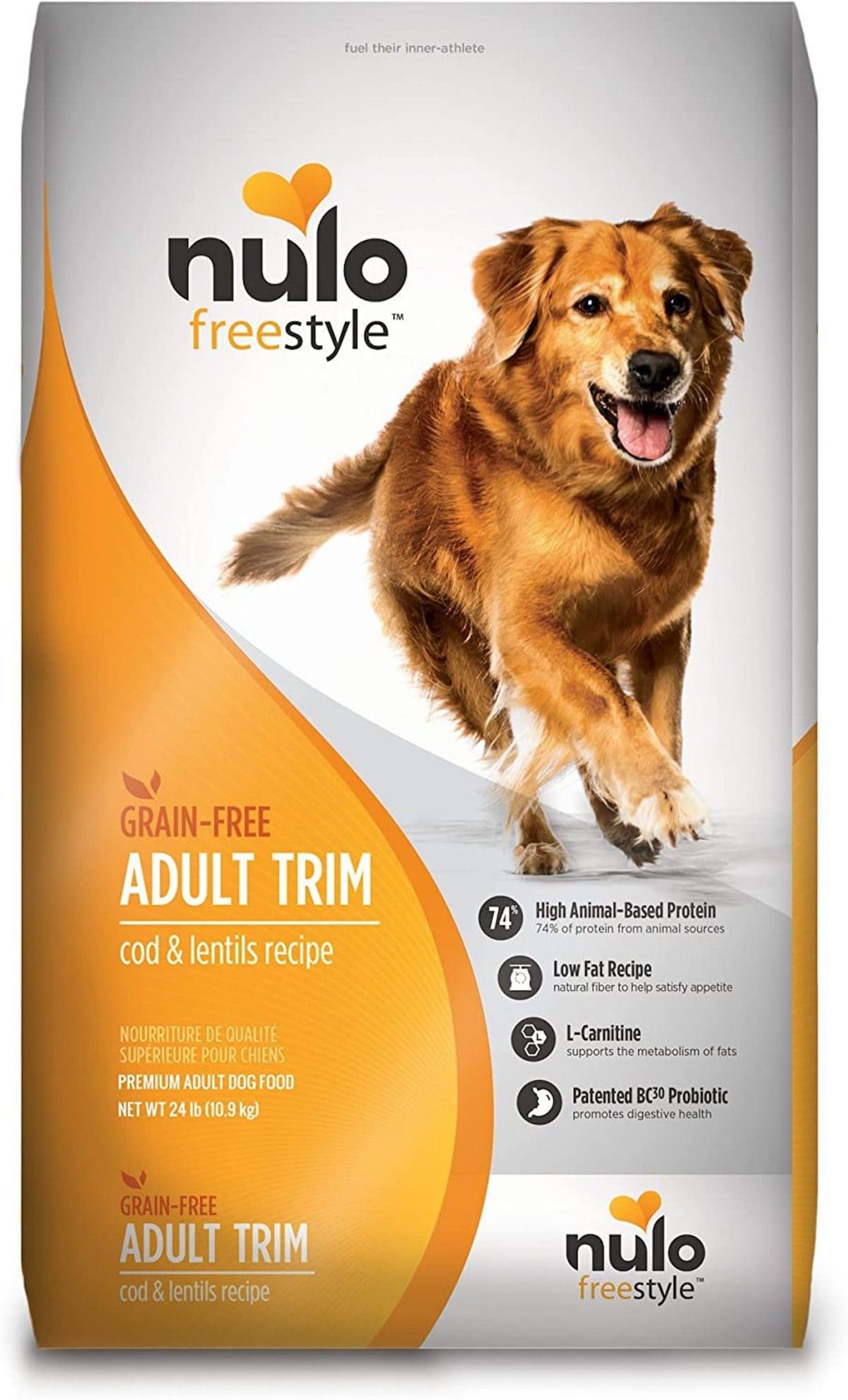
Nulo Adult Weight-Management
Grain-free, multi-protein diet recipe
This recipe features deboned cod as the primary protein, along with lean turkey meal and salmon. Also is fortified with L-carnitine, an effective fat burner.
About: Nulo Weight-Management Cod and Lentil Recipe is a grain-free, multi-protein recipe designed to help overweight pups shed a few pounds. It will also serve as a great food for dogs who are prone to weight-gain, even if they're still at a healthy body weight.
Features: Nulo Weight-Management Recipe uses deboned cod as the primary protein, but it also contains turkey meal, salmon meal, and deboned turkey.
A grain-free recipe, Nulo uses lentils, yellow peas, sweet potato, and chick peas to provide the necessary carbohydrates, and a collection of dried fruits and vegetables — including tomatoes, carrots, blueberries, and apples — add taste and additional nutritional value.
Typical vitamin and mineral supplements round out the ingredient list, and the recipe is fortified with a single probiotic strain — Bacillus coagulans.
Nulo is a U.S.-based company, located in Austin, Texas.
PROS
Nulo checks off most of the boxes an owner would want. And, several owners reported that it helped to increase their dog's activity level and shed a few pounds. It includes nutritious proteins, fruits, and vegetables, and it has a taste most dogs love. Additionally, it is fortified with L-carnitine, which may help your dog burn fat more effectively.
CONS
Unfortunately, this isn't a particularly low-calorie food. Nevertheless, many owners reported that it helped their pet lose weight. The bigger issue is the grain-free nature of the food. Some grain-free foods have been linked with dilated cardiomyopathy in a very small number of dogs. So, it is probably best to avoid grain-free foods unless your vet specifically advises you otherwise.
Calories per Cup: 368
Ingredients List
Deboned Cod, Turkey Meal, Salmon Meal, Lentils, Yellow Peas... ,
Sweet Potato, Chickpeas, Pea Fiber, Deboned Turkey, Chicken Fat (Preserved with Mixed Tocopherols & Citric Acid), Natural Flavor, Yeast Culture, Dried Chicory Root, Dried Tomatoes, Dried Carrots, Dried Blueberries, Dried Apples, Salt, Calcium Carbonate, L-Carnitine, Choline Chloride, Potassium Chloride, Zinc Proteinate, Vitamin E Supplement, L-Ascorbyl-2-Polyphosphate (Source of Vitamin C), Iron Proteinate, Niacin, Copper Proteinate, Thiamine Mononitrate (Source of Vitamin B1), Calcium Pantothenate, Vitamin A Supplement, Manganous Oxide, Pyridoxine Hydrochloride (Source of Vitamin B6), Sodium Selenite, Riboflavin, Vitamin D3 Supplement, Biotin, Dried Bacillus Coagulans Fermentation Product, Vitamin B12 Supplement, Calcium Iodate, Folic Acid, Rosemary Extract.
8. Nutro Natural Healthy Weight Dog Food
Most Affordable Option
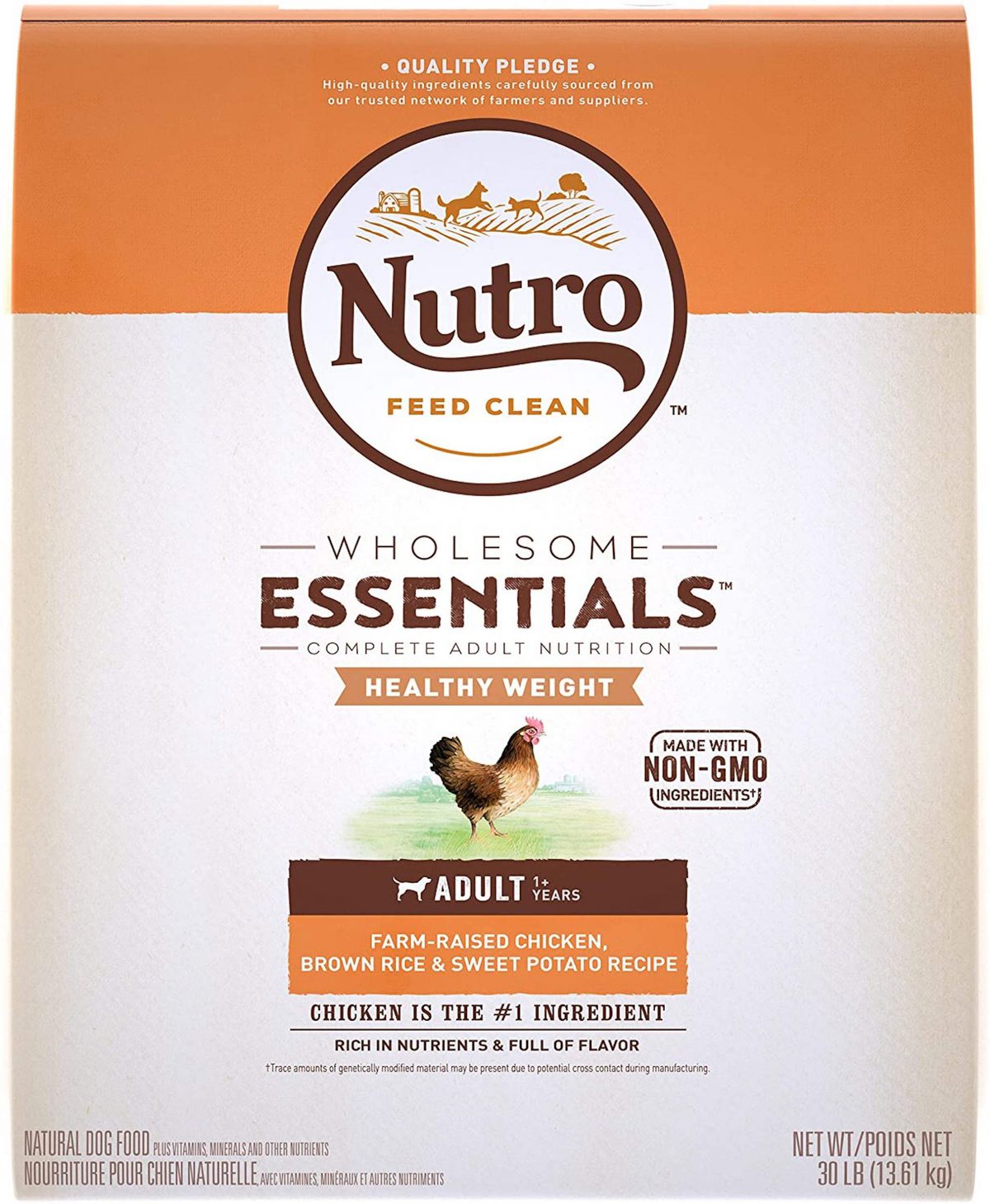
Nutro Natural Healthy Weight Dog Food
Affordable, low-cal diet dog food
This budget-friendly weight management formula features chicken and chicken meal as the first ingredients, along with wholesome, healthy grains like brown rice.
About: Another food that is great for portly pups, Nutro Natural Healthy Weight Recipe is a nutritious and delicious food, with a very low caloric value.
But despite being a low-calorie food, Nutro's Healthy Weight Recipe is full of tasty ingredients dogs love, such as real chicken and sweet potatoes.
Features: Nutro's Natural Healthy Weight Recipe is a very low-calorie dog food. With only 228 Calories per cup, this is a food that is clearly designed for weight loss.
But because it is important to provide your pup with the nutrition she needs while she's losing weight, Nutro uses an assortment of high-quality ingredients in this food.
This includes whole proteins like the chicken (the first listed ingredient), as well as whole brown rice, lamb meal and dried sweet potato.
This recipe also includes several antioxidant-rich ingredients, such as dried carrots, dried blueberries, and dried apples. Vitamin and mineral supplements round out the ingredient list.
PROS
Most owners who tried Nutro Healthy Weight Recipe raved about it. Many reported that it helped their pet lose significant amounts of weight — hardly a surprising revelation, given the reduced calorie content of the food. Many also reported that it increase their pup's energy level too.
CONS
We'd appreciate seeing probiotics appear on the ingredient list, but that's not the biggest problem in the world. The more troubling issue is that this food, while not grain free, contains some of the same ingredients (such as lentils) that have been correlated with heart disease problems in some other foods.
Calories per Cup: 228
Ingredients List
Chicken, Chicken Meal, Whole Brown Rice, Lentils, Rice Bran... ,
Powdered Cellulose, Split Peas, Brewers Rice, Sweet Potato, Dried Plain Beet Pulp, Dehydrated Alfalfa Meal, Natural Flavor, Pea Protein, Barley, Chicken Fat (Preserved With Mixed Tocopherols), Potassium Chloride, Salt, Choline Chloride, DL-Methionine, Mixed Tocopherols and Citric Acid (Preservatives), Pea Fiber, Zinc Sulfate, Niacin Supplement, Calcium Carbonate, Biotin, Vitamin E Supplement, Iron Amino Acid Chelate, D-Calcium Pantothenate, Riboflavin Supplement (Vitamin B2), Selenium Yeast, Vitamin B12 Supplement, Copper Amino Acid Chelate, Pyridoxine Hydrochloride (Vitamin B6), Manganese Amino Acid Chelate, Vitamin A Supplement, Thiamine Mononitrate (Vitamin B1), Vitamin D3 Supplement, Potassium Iodide, Folic Acid, Rosemary Extract.
9. Blue Wilderness Healthy Weight Dog Food
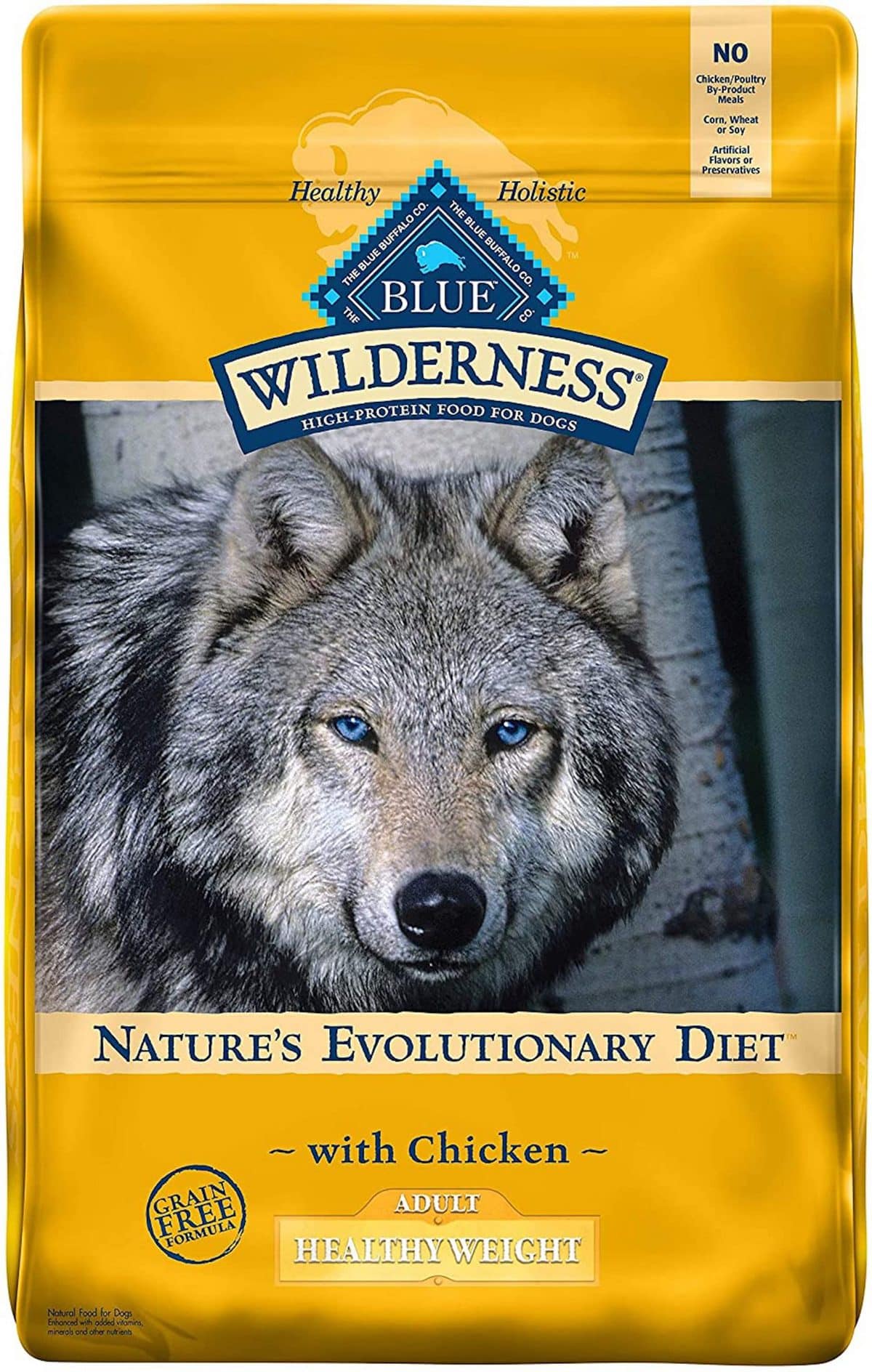
Blue Wilderness Healthy Weight Dog Food
High-protein weight-management recipe
This weight-loss recipe features proteins from deboned chicken, chicken meal and menhaden fish meal plus five different probiotic stains to help regulate digestion.
About: Blue Wilderness Healthy Weight Dog Food is a grain-free, meat-rich recipe designed to mimic the ancestral diet of wild canines. It has more calories than some of the other weight-loss foods we discuss here, but it is still deserving of serious consideration – especially for dogs who require a grain-free diet.
Features: Most Blue Wilderness recipes feature a variety of proteins, but this recipe only contains three primary proteins: deboned chicken, chicken meal, and menhaden fish meal (which is primarily included as a source of omega-3 fatth acids, rather than protein).
But this is to be expected of a weight-loss recipe, given the caloric density of proteins. Nevertheless, this food still has more than 350 calories per cup, so you don't have to worry about your pooch going hungry while she's shedding weight.
This is also a grain-free recipe, so it uses things like peas and tapioca starch to provide most of the carbohydrate content. Blueberries, cranberries, parsley, kelp and several other ingredients provide vitamins, minerals, and antioxidants, and five different probiotic strains are included to help regulate your dog's digestive system.
Blue Wilderness recipes are made in the USA.
PROS
Most Blue Wilderness foods are popular with owners, and their Healthy Weight Recipe is no exception. Many owners reported that their dog seemed to love the taste, and that it helped their dog lose weight. It also appears to be very easy for some dog to digest, and several owners reported improved elimination habits after switching to this food.
CONS
While this food is a great option for dogs who require a grain-free food, most dogs digest grains perfectly well, making a grain-free option completely unnecessary. As far as owners go, the only consistent complaint was that some dogs just didn't like the taste. A few also reported mild intestinal upset, but this is pretty common anytime you change your dog's diet.
Calories per Cup: 353
Ingredients List
Deboned Chicken, Chicken Meal (source of Glucosamine and Chondroitin Sulfate), Pea Protein, Peas, Tapioca Starch... ,
Pea Starch, Menhaden Fish Meal (source of Omega 3 Fatty Acids), Pea Fiber, Natural Flavor, Flaxseed (source of Omega 6 Fatty Acids), Powdered Cellulose, Chicken Fat (preserved with Mixed Tocopherols), Dried Tomato Pomace, Dehydrated Alfalfa Meal, DL-Methionine, Potatoes, Dried Chicory Root, Choline Chloride, Alfalfa Nutrient Concentrate, Calcium Carbonate, Dicalcium Phosphate, preserved with Mixed Tocopherols, Sweet Potatoes, Carrots, L-Carnitine, Zinc Amino Acid Chelate, Zinc Sulfate, Vegetable Juice for color, Salt, Ferrous Sulfate, Vitamin E Supplement, Iron Amino Acid Chelate, Blueberries, Cranberries, Barley Grass, Parsley, Turmeric, Dried Kelp, Yucca Schidigera Extract, Niacin (Vitamin B3), Calcium Pantothenate (Vitamin B5), L-Ascorbyl-2-Polyphosphate (source of Vitamin C), L-Lysine, Copper Sulfate, Biotin (Vitamin B7), Vitamin A Supplement, Copper Amino Acid Chelate, Manganese Sulfate, Taurine, Manganese Amino Acid Chelate, Thiamine Mononitrate (Vitamin B1), Riboflavin (Vitamin B2), Vitamin D3 Supplement, Vitamin B12 Supplement, Pyridoxine Hydrochloride (Vitamin B6), Calcium Iodate, Dried Yeast, Dried Enterococcus faecium fermentation product, Dried Lactobacillus acidophilus fermentation product, Dried Aspergillus niger fermentation extract, Dried Trichoderma longibrachiatum fermentation extract, Dried Bacillus subtilis fermentation extract, Folic Acid (Vitamin B9), Sodium Selenite, Oil of Rosemary
How Many Calories Does Your Dog Need?
Caloric needs are one of the most important things to figure out when trying to manage your dog's weight. This will give you a target to guide your feeding practices.
But it isn't always easy to determine exactly how many calories your dog needs. Individual dogs have different metabolic rates and burn different amounts of calories over the course of a day.
The best way to figure out your dog's caloric requirements is by first determining her Resting Energy Requirements (RER). This tells you the number of calories your dog needs to breathe, pump blood and perform other critical body processes.
To determine a dog's RER, you raise her body weight in kilograms to the ¾ power (to convert your dog's weight in pounds to kilograms, just divide her weight in pounds by 2.2). This number is then multiplied by 70, which gives you the number of Calories she needs per day.
To borrow an example from Ohio State University Veterinary Medical Center:
A 10-kilogram dog = 70(10)3/4 = 400 Calories = RER
This number (the RER) is then multiplied by one of several factors to arrive at her true caloric needs.
For example:
- Puppies have a factor of 2.0 to 3.0, depending on their age.
- Unaltered adults have a factor of 1.8
- Spayed or neutered adults have a factor of 1.6
So, assuming our original 10-kilogram dog is a spayed adult, she'd need about 640 Calories of food each day. If she were not spayed, she'd need a few more calories, totaling about 720.
Overweight dogs should use a factor of 1 when determining their daily caloric needs. Also, the RER should be determined using her ideal body weight.
This means that if our 10-kilogram dog is about 2 kilograms overweight, the formula would be:
70(8)3/4 = 332 = RER
Multiplying this by a factor of 1 means that she'd need to eat about 332 Calories per day to lose weight safely. As a ballpark figure, many vets recommend cutting the daily caloric intake of overweight dogs by about 25%.
But, I can already hear you thinking: That's too much math. How the hell do you raise something to a fraction, anyway?
Fortunately, you don't have to worry about this if you don't want to. Instead, you can just consult a body weight chart, like this one, published by the World Small Animal Veterinary Association. You can also check out this calculator, from Dog Food Advisor.
Again, all dogs are individuals, and the formula and chart referenced above should only be used to arrive at an estimate. Your dog's actual caloric requirements may differ from this figure by 50% in some cases.
How Do I Know if My Dog Is Overweight?
Always take your dog in for a veterinary visit if you suspect she is overweight. That way, he or she can make a determination and help identify potential causes and illuminate appropriate treatment solutions.
However, there are a few things you can consider when trying to decide if your pet is overweight. The first is to compare the standard of her breed against her body weight. If she exceeds the average weight of her breed (for her height), then she is – by definition – overweight. The term "obese" only applies when a dog's body weight is 10% to 15% above a healthy body weight.
It can also be helpful to consult a Body Condition Scoring Chart (like this one) to determine if your dog is overweight.
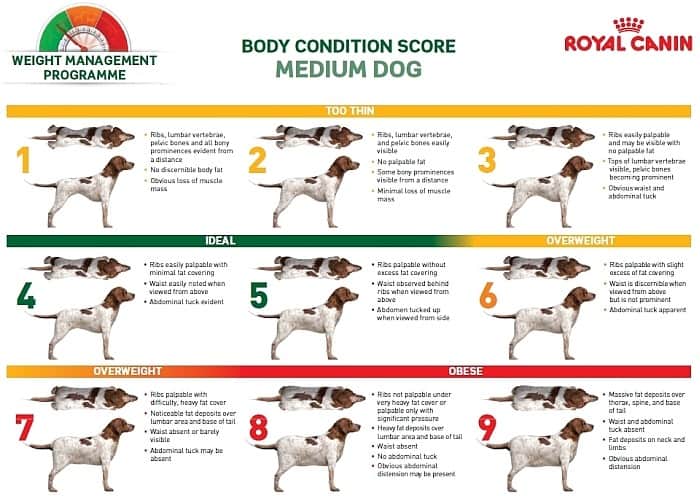
Other Things You Can Do to Help Your Dog Lose Weight
Switching to a weight-loss dog food is a great way to help your pooch lose her paunch, but it isn't the only way to achieve results. You can also use the following strategies and techniques to help her slim down.
Increase the Amount of Exercise She Gets
If caloric intake is one side of the body weight coin, exercise is the other. By increasing the amount of exercise your dog receives, you'll also increase the number of calories she needs on a daily basis. But, if you don't increase her food intake, she'll have to fuel her body by burning stored fat.
Just be sure to start any exercise regimen gradually to avoid causing injuries. Don't just head out for a 5-mile-run with your couch potato canine. Start with short walks, and gradually increase their length.
Stop Feeding Treats
Many owners neglect to consider the calories they provide in the form of treats. This is especially problematic for small dogs, for whom each treat represents a significant percentage of their daily caloric intake.
Stop Feeding People Food
While there's probably nothing wrong with giving your dog the occasional French fry or green bean, owners who routinely feed their dog high-calorie people foods are setting their dog up for health problems. Generally speaking, you'll want to feed your pooch dog food and keep the people food for yourself.
Visit Your Veterinarian
You'll always want to keep your vet in the loop if you are trying to help your dog shed a few pounds, and your vet may be able to provide additional assistance. For example, some overweight dogs suffer from medical problems that cause them to gain weight, and medications may help correct these types of problems.
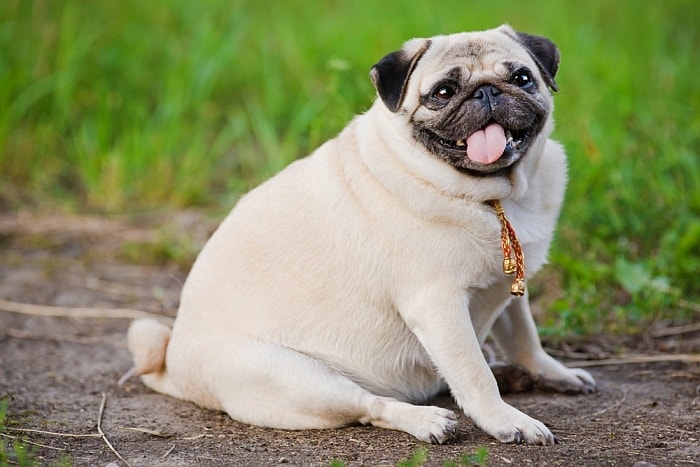
Has your dog ever had an issue with weight gain? What kinds of things did you do to help her burn off some of her pudge? Did you switch foods or begin an exercise regimen?
Let us know all about your experiences in the comments below.
Source: https://www.k9ofmine.com/best-dog-foods-for-losing-weight/